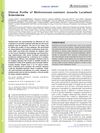4350 citations,
May 2012 in “Arthritis & Rheumatism” The new SLICC criteria for diagnosing lupus are more sensitive and accurate than the old criteria.
[object Object] 
Intradermotherapy with minoxidil is as effective as topical application for treating hair loss.
1 citations,
November 2011 in “British journal of pharmacology” Enzymes are classified into six types and are essential for many biological processes, with only a few targeted by drugs.
 17 citations,
February 2011 in “Expert Opinion on Drug Safety”
17 citations,
February 2011 in “Expert Opinion on Drug Safety” Manage side effects of hepatitis C treatment with dose changes and medications, which may improve patient adherence and treatment success.
 October 2018 in “Journal of the European Academy of Dermatology and Venereology”
October 2018 in “Journal of the European Academy of Dermatology and Venereology”  1 citations,
October 2023 in “Life science alliance”
1 citations,
October 2023 in “Life science alliance” Pantethine may boost the immune system's ability to fight sarcoma.
5 citations,
December 2023 in “Materials” Organic and biogenic nanocarriers can improve drug delivery but face challenges like consistency and safety.

Nanoformulations improve luteolin's effectiveness as a cancer treatment.
 2 citations,
January 2019 in “Biomedical Journal of Scientific and Technical Research”
2 citations,
January 2019 in “Biomedical Journal of Scientific and Technical Research” Saw palmetto in hair products might reduce hair loss but can cause side effects.
 3 citations,
January 2018 in “Open Access Macedonian Journal of Medical Sciences”
3 citations,
January 2018 in “Open Access Macedonian Journal of Medical Sciences” Implant safely and effectively treats hair loss.
 16 citations,
December 2012 in “The Clinical Journal of Pain”
16 citations,
December 2012 in “The Clinical Journal of Pain” Chronic scalp pain in trichodynia involves both body-wide and localized increased pain sensitivity.
 5 citations,
January 2020 in “Journal of Dermatology”
5 citations,
January 2020 in “Journal of Dermatology” Temporal hair loss relates to overall scalp hair loss in women.
 10 citations,
June 2019 in “Aesthetic Plastic Surgery”
10 citations,
June 2019 in “Aesthetic Plastic Surgery” Amniotic allograft may be more effective than platelet-rich plasma for midface aging treatment.
 62 citations,
October 2017 in “JAMA facial plastic surgery”
62 citations,
October 2017 in “JAMA facial plastic surgery” Condensed nanofat with fat grafts effectively improves atrophic facial scars.
 January 2006 in “Journal of Rural Medicine”
January 2006 in “Journal of Rural Medicine” Trichotillomania is more common than previously thought, with increasing diagnosed cases.
 82 citations,
June 2020 in “Inflammation Research”
82 citations,
June 2020 in “Inflammation Research” Skin problems in COVID-19 patients are rare and may be due to the body's complex immune response or blood clotting issues.
 9 citations,
January 2023 in “Dermatology and therapy”
9 citations,
January 2023 in “Dermatology and therapy” A 14-year-old girl with severe hair loss regrew her hair using upadacitinib.
 8 citations,
January 2019 in “Acta dermato-venereologica”
8 citations,
January 2019 in “Acta dermato-venereologica” Some children with localized scleroderma are rarely resistant to methotrexate, and no common profile for resistance was found.
 16 citations,
December 2016 in “Molecular Medicine Reports”
16 citations,
December 2016 in “Molecular Medicine Reports” Platelet-rich plasma may help hair follicle cells grow by affecting certain genes and pathways.
 1 citations,
August 2021 in “Movement disorders clinical practice”
1 citations,
August 2021 in “Movement disorders clinical practice” A man with Isaac's syndrome affecting only one side of his body improved after immune system-targeted treatment.
 6 citations,
February 2016 in “British Journal of Dermatology”
6 citations,
February 2016 in “British Journal of Dermatology” A woman with a drug allergy to anakinra was successfully desensitized, allowing her to continue treatment without allergic reactions.
12 citations,
January 2016 in “Journal of clinical biochemistry and nutrition” Deferasirox combined with sorafenib reduces liver cancer risk and lessens treatment side effects.
 19 citations,
February 2008 in “Archives of Dermatological Research”
19 citations,
February 2008 in “Archives of Dermatological Research” Mast cells might contribute to hair loss by causing skin thickening.
 26 citations,
July 2019 in “JAAD Case Reports”
26 citations,
July 2019 in “JAAD Case Reports” Dupilumab for atopic dermatitis may cause new or worsen existing alopecia areata.
[object Object]  22 citations,
October 2012 in “Journal of Investigative Dermatology”
22 citations,
October 2012 in “Journal of Investigative Dermatology” Altered retinoid metabolism in cicatricial alopecia suggests a balanced vitamin A diet may prevent the condition.
 7 citations,
January 2009 in “Immunological investigations”
7 citations,
January 2009 in “Immunological investigations” A 3-year-old boy lost all his hair due to a rare reaction to phenobarbital, but it grew back after steroid treatment.
 5 citations,
October 2015 in “The American journal of pathology”
5 citations,
October 2015 in “The American journal of pathology” Mice with a mutated Dsg3 gene showed severe symptoms but not the typical blistering of pemphigus vulgaris.
 8 citations,
February 2022 in “Journal of Clinical Medicine”
8 citations,
February 2022 in “Journal of Clinical Medicine” Many COVID-19 patients experience temporary hair loss after infection, not linked to infection severity or treatment.
 4 citations,
August 2018 in “Facial Plastic Surgery Clinics of North America”
4 citations,
August 2018 in “Facial Plastic Surgery Clinics of North America” Platelet-Rich Plasma (PRP), a protein-rich extract from a patient's blood, shows promise in improving hair density, thickness, and quality, but the best method of use and number of treatments needed for noticeable results are still unclear.
 19 citations,
August 2018 in “International Journal of Dermatology”
19 citations,
August 2018 in “International Journal of Dermatology” Lupus panniculitis of the scalp causes linear hair loss and needs ongoing treatment to prevent recurrence and lupus.

























